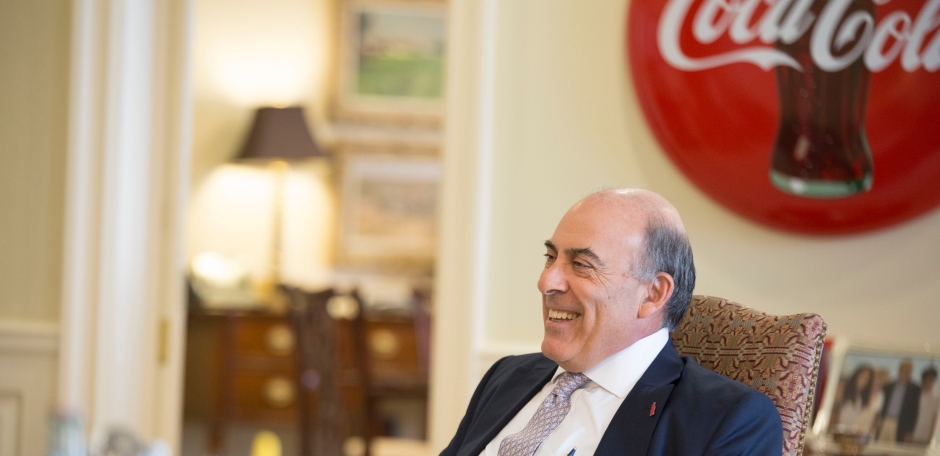Failure doesn't have to keep you from reaching your goals. Many of the world's most influential people, from George Washington to The Beatles, failed yet forged ahead to achieve success.
Quite a few CEOs from some of the biggest companies in the world have also learned from failure. Here are five lessons on failure from the tremendously successful CEOs of Alibaba Group Holding Ltd (BABA +2.72%), Amazon.com (AMZN +1.29%), The Coca-Cola Company (KO +0.50%), Charles Schwab Corporation (SCHW +0.45%), and Tesla (TSLA +4.31%).

Image source: Getty Images.
1. Understand that failure is just a stop on the way to success
Jack Ma founded Alibaba in 1999 and served as CEO until 2013, but he still retains the position of executive chairman. The Chinese e-commerce company is one of the world's largest retailers and internet companies, with a market cap of around $400 billion. Alibaba's success has also made Ma the richest person in Asia and one of the richest people in the world.
Ma wasn't always so successful, though. He failed the entrance exam required to attend college in China three times before passing. He was turned down by all 30 companies for which he applied for jobs after graduating college. Through it all, however, Ma knew that "giving up was the greatest failure." His view was and is that failure is only a stop on the way to success.
2. Be willing to have small failures to avoid bigger ones
Jeff Bezos founded Amazon in 1994 and went online the following year. Amazon started off selling books but later expanded into selling nearly everything, including cloud hosting services. The company now claims a market cap of around $480 billion. Amazon's boom has made Bezos one of the three richest people on the planet.
Bezos says that everyone should expect "a certain amount of failure." His philosophy is that "if you invent frequently and are willing to fail, then you never get to that point where you really need to bet the whole company." Bezos' principle doesn't only apply to the business world, though. Those who are willing to place small bets and fail early on are more likely to avoid bigger failures later.
3. Celebrate failures along with successes
Muhtar Kent served as CEO of The Coca-Cola Company beginning in 1999. He stepped down as CEO on May 1, 2017, but kept his position as chairman of the board of directors. Kent has been ranked as one of the most popular CEOs in the country among employees.

Kent told alumni of Hult International Business School in 2014 that celebrating failures as well as successes is important to any organization. He said:
If I would do anything different in my 36 years of career, then it would be to create an atmosphere which allows mistakes, as you learn so much from mistakes. We are not bold enough to take enough risks, and risk is critical for success. We don't make enough mistakes. Don't be afraid of making mistakes; just don't repeat them.
4. What you learn from failure can help you for a lifetime
Walt Bettinger has been CEO of Charles Schwab since 2008. He led the company through the tumultous financial crisis of 2008 and 2009. Charles Schwab now ranks as the largest publicly traded investment services firm in the U.S. and is one of the world's largest financial services firms.
One of the most important lessons Bettinger learned was during his senior year of college. He had a perfect 4.0 grade point average headed into the final exam of a business strategy class. Bettinger had studied for hours, but he failed the exam. Why? The only question on the exam was: "What's the name of the lady who cleans this building?" Bettinger didn't know. He learned from this failure to get to know everyone he works with -- a lesson he has taken to heart his entire career.
5. Fail intelligently
Elon Musk has led multiple innovative organizations, including PayPal, Neuralink, SpaceX, and Tesla. The latter is most known for its sporty electric cars, but the company also markets solar roofs, rechargeable energy storage products for homes, and is planning to launch an electric-powered semi truck.
Musk says that the key to bouncing back from failure is to "fail intelligently." He once said:
When starting out Tesla and SpaceX, in both cases, I thought the odds of success were less than 50%... So it's not as though I was convinced that it would all work. I thought, 'Well, it probably won't work, but it's worth a try because the outcome is important.'
The lesson from Musk is that failure is fine if you're always learning and the attempt was worth the risk.